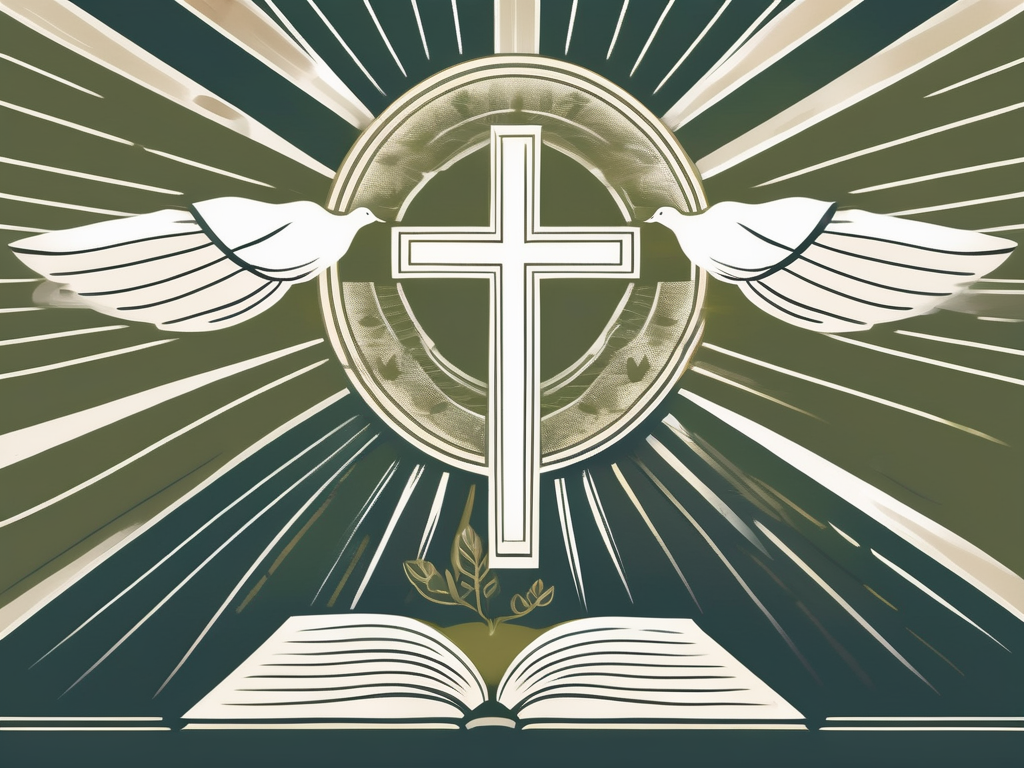In today’s fast-paced and hectic world, finding time to rest and recharge is essential for our physical, mental, and spiritual well-being. For Christians, the concept of Sabbath holds great significance. But what exactly does the Bible say about the Sabbath? Let’s dive into this topic and discover its biblical foundations, interpretations, and its relevance in our lives today.
Understanding the Concept of Sabbath in the Bible
Before we explore the specifics, let’s first grasp the concept of Sabbath as mentioned in the Bible. Sabbath, derived from the Hebrew word “Shabbat,” means to cease, rest, or stop. It is a designated day of the week dedicated to worshiping God, resting from work, and finding renewal in His presence.
The Origin of Sabbath in the Old Testament
The significance of Sabbath can be traced back to the creation story itself. In Genesis 2:2-3, we read that after six days of creative work, God rested on the seventh day and blessed it, setting it apart as a holy day. The Sabbath became an integral part of the Jewish and later Christian faith because of this divine example.
As we delve deeper into the origins of the Sabbath, we find that it is not merely a day of idleness, but a day of intentional rest and reflection. It is a time to pause and appreciate the beauty of God’s creation, to acknowledge His sovereignty and provision.
Furthermore, the Sabbath serves as a reminder of the Israelites’ liberation from slavery in Egypt. In Deuteronomy 5:15, the command to observe the Sabbath is linked to the Israelites’ deliverance from bondage. It is a day to remember and celebrate God’s faithfulness in setting His people free.
Sabbath in the Ten Commandments
The Ten Commandments play a central role in defining the moral framework for believers. Exodus 20:8-11 records the fourth commandment, which instructs us to remember the Sabbath day and keep it holy. God commanded His people to set aside the seventh day of the week as a day of rest and worship, mirroring His own rest after creation.
Observing the Sabbath is not merely a suggestion but a commandment given by God Himself. It is a way for believers to honor God and prioritize their relationship with Him. By dedicating a day to rest and worship, individuals are reminded of their dependence on God and their need for spiritual renewal.
Throughout the Old Testament, we see various examples of how the Israelites observed the Sabbath. It involved refraining from work, engaging in communal worship, and spending quality time with family and loved ones. The Sabbath was a time of joy and celebration, a day set apart from the busyness of everyday life.
As we transition to the New Testament, we find that Jesus, during His earthly ministry, upheld the importance of the Sabbath. However, He also challenged the legalistic interpretations and traditions that had developed around it. Jesus emphasized the heart behind Sabbath observance, teaching that it is a day for acts of mercy and compassion.
Today, Sabbath observance varies among different Christian denominations and individuals. While some adhere to strict rest and worship practices on a specific day of the week, others view the Sabbath as a broader concept of finding rest and renewal in God’s presence throughout each day.
Regardless of the specific practices, the underlying principle of Sabbath remains relevant and significant. It is a time to pause, reflect, and draw near to God. It is a reminder of His faithfulness, His provision, and His desire for His people to find rest and restoration in Him.
The Sabbath in the New Testament
The arrival of Jesus brought profound changes to religious practices, raising questions about the observance of the Sabbath. Let’s explore how the New Testament sheds light on this topic and the teachings of Jesus and Paul in relation to the Sabbath.
The Sabbath, a day of rest and worship, held great significance in the Jewish tradition. It was a day set apart from the rest of the week, a time to cease from work and focus on God. However, as with many religious practices, the Sabbath had become burdened with rules and regulations, losing sight of its true purpose.
Jesus, during His earthly ministry, expressed a compassionate and balanced approach to the Sabbath. He emphasized its true purpose, which is not to burden people but to bring them rest and restoration. Jesus understood that the Sabbath was made for humanity, not the other way around.
Throughout the Gospels, we see Jesus engaging in acts of healing on the Sabbath. These acts showcased God’s goodness and mercy above strict legalistic interpretations of Sabbath observance. Jesus demonstrated that acts of compassion and love should not be restricted by rigid rules.
Paul, one of the key figures in the early Christian church, also addressed the topic of the Sabbath in his writings. In Colossians 2:16-17, Paul urges believers not to judge one another based on Sabbath observance. He highlights how the observance of specific days is a matter of personal conviction and freedom in Christ.
Paul’s teachings emphasize that the Sabbath, while still important, should not be a source of division among believers. He encourages Christians to focus on the unity found in Christ rather than getting caught up in debates about specific religious practices.
It is important to note that while the New Testament provides insights into the Sabbath, there is no clear-cut directive on how it should be observed by Christians. The emphasis shifts from strict adherence to the letter of the law to a deeper understanding of the principles behind the Sabbath.
Ultimately, the New Testament teaches us that the Sabbath is a time for rest, worship, and reflection. It is a day to reconnect with God and find restoration for our souls. Whether we observe it on a specific day or in a more flexible manner, the Sabbath serves as a reminder of God’s provision and His desire for us to find rest in Him.
Different Interpretations of the Sabbath
Throughout history, various denominations and theologians have approached the Sabbath differently. Let’s examine some of these interpretations and their impact on contemporary Sabbath observance.
The concept of the Sabbath has been a topic of theological debate and interpretation for centuries. Different religious denominations have developed their own unique practices and beliefs regarding the observance of this sacred day.
One interpretation of the Sabbath can be found within the Christian community. Here, different denominations have varying practices regarding the Sabbath. Some adhere strictly to a Saturday Sabbath, reminiscent of the Jewish tradition, while others observe Sunday as the Lord’s Day, commemorating Christ’s resurrection.
The Seventh-day Adventist Church, for example, follows a strict Saturday Sabbath observance. They believe that the Sabbath should be kept holy and dedicate this day to worship, rest, and spiritual reflection. On the other hand, many Protestant denominations, such as the Anglican and Lutheran churches, observe Sunday as the Sabbath, considering it a day of rest and worship in honor of Christ’s resurrection.
Another important aspect of the Sabbath is the modern interpretation of Sabbath rest. With the changing cultural landscape and the demands of a fast-paced society, the understanding of Sabbath rest has evolved. Many believers now view it as a time of intentional rest, reflection, and reconnecting with God.
In today’s world, where people are constantly bombarded with distractions and responsibilities, the Sabbath offers a much-needed respite. It’s seen as an opportunity to step back from the busyness of life, engage in worship, and focus on deeper spiritual growth.
For some, Sabbath rest may involve attending religious services, spending time in prayer and meditation, or engaging in activities that bring them closer to God. It may also include spending quality time with loved ones, enjoying nature, or pursuing hobbies that bring joy and fulfillment.
Furthermore, the concept of Sabbath rest extends beyond the individual level. Many communities and organizations recognize the importance of collective rest and have implemented practices to honor the Sabbath. Some businesses close their doors on Sundays, allowing their employees to have a day of rest and spend time with their families.
In conclusion, the interpretation of the Sabbath varies among different denominations and individuals. While some adhere strictly to traditional practices, others embrace a more modern understanding of Sabbath rest. Regardless of the interpretation, the Sabbath continues to hold a significant place in the lives of believers, providing a sacred time for rest, reflection, and spiritual growth.
Theological Perspectives on the Sabbath
Various theological perspectives highlight the broader implications of Sabbath observance. Let’s explore two of these perspectives: the Sabbath as a covenant, the Sabbath’s connection to eschatology, and the significance of the Sabbath in different religious traditions.
The Sabbath as a Covenant
For some theologians, the Sabbath is seen as a covenant between God and His people. It not only represents physical rest but also symbolizes the eternal rest believers will find in God’s presence. Observing the Sabbath becomes an act of faithfulness and a visible sign of being part of God’s covenant community.
This perspective draws upon the biblical narrative of the Ten Commandments, where the observance of the Sabbath is emphasized as a sign of the covenant between God and the Israelites. The Sabbath is seen as a sacred time set apart for worship, reflection, and rejuvenation. It serves as a reminder of God’s faithfulness and His desire for His people to find rest and restoration in Him.
Furthermore, the Sabbath as a covenant extends beyond the individual believer to the community as a whole. It fosters a sense of unity and shared purpose among believers, as they collectively observe this sacred day. It becomes a time for communal worship, fellowship, and the strengthening of relationships.
The Sabbath and Eschatology
Eschatology deals with the study of the final events and the fulfillment of God’s purposes in history. Some theologians connect the Sabbath with eschatological hope, viewing it as a foretaste of the eternal kingdom of God. The Sabbath acts as a reminder that God’s ultimate plan includes a time of rest and restoration for His creation.
In this perspective, the Sabbath becomes a symbol of hope and anticipation for believers. It points towards a future where all things will be made new, where pain and suffering will cease, and where God’s kingdom will be fully established. The observance of the Sabbath becomes an act of faith, as believers trust in God’s promise of a future Sabbath rest.
Moreover, the Sabbath and eschatology are intertwined in the concept of liberation. Just as the Sabbath provided liberation for the Israelites from their bondage in Egypt, it also foreshadows the ultimate liberation that will come with the fulfillment of God’s eschatological plan. The Sabbath becomes a time to reflect on and long for the day when all creation will be set free from sin and brokenness.
The Significance of the Sabbath in Different Religious Traditions
While the Sabbath holds a central place in Judaism, it also carries significance in other religious traditions. In Christianity, for example, the Sabbath has evolved into the observance of Sunday as the Lord’s Day, commemorating the resurrection of Jesus Christ. It is a day of worship and spiritual reflection, where believers gather to celebrate the victory of Christ over sin and death.
In Islam, Friday is considered a sacred day and serves as a weekly congregational prayer day. Muslims gather in mosques for communal worship and listen to sermons that provide guidance and inspiration for their daily lives.
Similarly, in Hinduism, Saturday is often considered a day dedicated to the worship of Lord Shani, the deity associated with the planet Saturn. Devotees engage in rituals and prayers to seek blessings and protection from Lord Shani.
These examples illustrate the diverse ways in which the Sabbath or its equivalent is observed across different religious traditions. While the specific practices and beliefs may vary, the underlying significance of setting aside a day for rest, worship, and spiritual reflection remains a common thread.
The Sabbath and Christian Life
Now that we have explored the biblical foundations and different perspectives on the Sabbath, let’s turn our attention to its practical implications for our lives today.
The Role of Sabbath in Spiritual Growth
Observing the Sabbath can serve as a vital tool for spiritual growth. By intentionally setting aside time to rest, worship, and engage in meaningful activities, we create space for God to speak to us and transform our lives. It becomes an opportunity to deepen our relationship with Him and align our hearts with His will.
Practical Ways to Observe the Sabbath Today
While there is no one-size-fits-all approach to Sabbath observance, incorporating certain practices can help us experience its benefits. This could include attending church services, spending quality time with loved ones, engaging in acts of service and compassion, pursuing hobbies that bring joy, and disconnecting from the noise of technology to cultivate moments of stillness and solitude.
In conclusion, the Bible holds profound insights into the concept of Sabbath. It serves as a reminder of God’s creative power, His desire for our well-being, and our need for rest in a fast-paced world. Despite differing interpretations, the Sabbath stands as a gift that can enrich our spiritual journey and help us find renewal in God’s presence. Let us embrace the invitation to rest, worship, and grow in our relationship with the One who said, “Come to me, all you who are weary and burdened, and I will give you rest” (Matthew 11:28 NIV).












